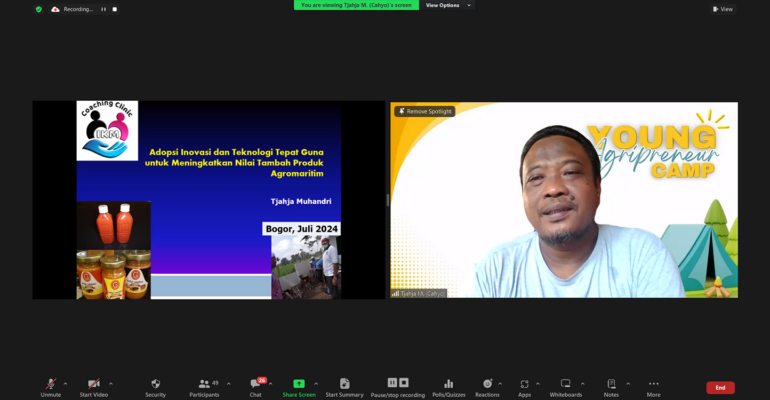Creating Sociopreneurs, DPMA IPB University Holds Workshop on Local Superior Product Development

The Directorate of Agromaritime Community Development (DPMA) of IPB University held the second workshop of the Young Agripreneur Camp (YAC) program attended by students with the theme of the application of technology and innovation in the development of local superior products.
This workshop is a briefing that provides general knowledge that becomes a provision for YAC participants before carrying out field project activities. In 2024, there are 6 commodities that students can choose from, namely papaya, sweet potato, organic vegetables, Nutrient Film Technique (NFT) hydroponics, quail, and fish.
The workshop presented Dr Tjahja Muhandri, a lecturer from the Department of Food Science and Technology of IPB University and an expert practitioner who has many product processing innovations. He gave a briefing on the application of technology and innovation in agromaritime product diversification.
“Traditional MSMEs often face problems such as choosing the wrong product, the wrong production process, inappropriate packaging, fear of licensing, and lack of mentors. This briefing is expected to open students’ knowledge to develop products appropriately,” said Dr Tjahja.
He said that before determining product innovation in the marketing aspect, entrepreneurs need to plan whether their products are based on consumer needs (market driven) or technology (technology driven). It is also important to know the appropriate adoption of innovation and technology.
“Some aspects that need to be known are understanding the character of raw materials, understanding the principles of the process, recognizing the technology around, and calculating the suitability and feasibility of scale. The final stage is the proper packaging of the product so as to increase the selling value of the product and increase consumer interest in choosing the product to be purchased,” said Dr. Tjahja.
This workshop provided general knowledge to YAC participants to motivate them to develop superior products, both their own products and products of the surrounding community. This aims to create more sociopreneurs in the future. (IAAS/FAE)



